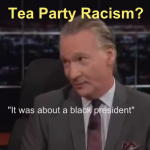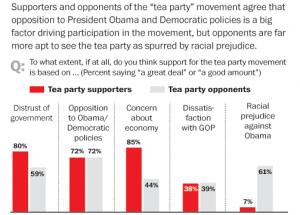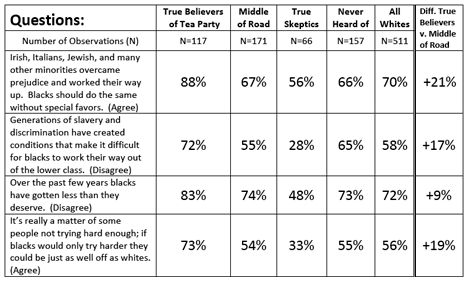 “It was about a black president.”
“It was about a black president.”
—Talk show host Bill Maher, on the origin of the tea party movement during the Feb. 28, 2014 airing of the HBO show “Real Time”
Overview
Maher’s on-air comment provides a good opportunity to assess whether racism serves as an origin or continuing motive of the tea party movement. The charge is common in the media and among Democratic Party officeholders. Maher’s claim reminds us that it’s past time to weigh the evidence, and we find it skimpy and equivocal.
The Facts
HBO’s “Real Time” with host Bill Maher featured an exchange between conservative pundit Bill Kristol and Maher on the tea party movement. Maher said the tea party started out in opposition to the government bailouts, then later said the tea party started in response to having a black president. Truth Revolt posted a safe-for-work transcript. Here’s part of it:
Kristol: What was the origin of the Tea Party five years ago? It wasn’t about bailouts.
Maher: Sure it was.
Kristol: It was not. It was about a mortgage bill and then it was about Obamacare and then it was about a stimulus…
Maher: It was about a black president. But lets…
Kristol: That’s bull****! That is total bull****.
Maher has made past comments about tea party racism:
“It’s funny, ’cause the teabaggers – the one thing they hate: when you call them racist. The other thing they hate is black people.[“]
Maher’s expressing a popular opinion. Many people think the tea party is motivated, at least in part, by racism. A 2010 Washington Post poll found 61 percent of tea party opponents believed the movement was motivated “a great deal” or “a good amount” by racism.
Analyzing the Rhetoric
We’ll address two main issues from the exchange between Maher and Kristol. First, we’ll consider whether racism was behind the origin of the tea party. Second, we’ll look at whether racism serves as a primary motivation for the tea party.
Tea Party History
The Encyclopedia Britannica entry on the tea party tracks closely with the account Kristol gave on “Real Time.” CNBC commentator Rick Santelli gave an on-air rant on Feb. 19, 2009 that inspired the “tea party” name after he suggested a Lake Michigan version of the Boston Tea Party. A mortgage bill championed by the Obama administration prompted Santelli’s rant. The tea party movement proper kicked off with a nationwide set of April 15 protests.
Later that year, tea party activists turned out in opposition to the health care reform legislation proposed by the Democrats. The version that became law is commonly called “Obamacare.”
Maher suggested the tea party opposed the 2008 bailouts. Maher’s not completely off, even though there was no “tea party” as such in 2008. It’s fair to connect opposition to the TARP loan program and later opposition to the $800 billion stimulus bill President Obama signed the day before Santelli’s rant. Santelli helped coalesce the group of people who opposed those policies.
There’s an obvious weakness in Maher’s account of the tea party. If the movement opposed the TARP bailouts advocated by President Bush before Obama was elected, then how is the movement a response to a black president? Bush signed the TARP bill on Oct. 3, 2008. Opposition to the bill came primarily from conservatives.
There’s no clear reason why people opposed to policies like TARP, the stimulus, and the health care reform law need to rely on race as a motivation. It’s not enough to point to the accident that the president championing the latter two policies happens to be black. We turn our attention now to the state of the evidence of tea party racism.
The Evidence for Tea Party Racism
We divide the evidence of tea party racism into two groups. The first group consists of research and polling of the attitudes of the tea party or those who favor the tea party. The second group consists of anecdotal evidences, such as signs used at tea party rallies or comments made by individuals.
Research and Polling
We caution the reader to pay close attention to distinctions between racism and “racial resentment.”
2010 Multi-State Survey of Race & Politics
The University of Washington Institute for the Study of Ethnicity, Race and Sexuality released a study we found commonly referenced in attempts to show tea party racism.
Christopher S. Parker served as the lead researcher for the study, which relies on a battery of survey questions to assess racial attitudes and tea party support.
Salon editor-at-large Joan Walsh summarized the study’s initial findings:
[A] University of Washington poll released last week … looked at the views of Tea Party supporters in seven battleground states. Not only do they think too much is made of the problems facing black people, they have bigoted views about black people generally.
Lead researcher Parker linked to Walsh’s commentary when his own column on the study appeared in Salon:
Our initial analysis revealed that among whites, strong supporters of the Tea Party were less likely to see black people as hardworking, intelligent and trustworthy than whites who were strong skeptics of the Tea Party movement. Our findings were publicized widely, including here on Salon.
Parker’s work came in for some criticism, including a sharp rebuttal from Cathy Young at RealClearPolitics.
We judge Young’s criticism as essentially correct. The WISER study uses questions intended to measure “racial resentment,” following in the footsteps of a study by Kinder and Sanders from 1996. Donald R. Kinder emphasized that racial resentment is distinct from biological racism in a book, “Divided by Color,” describing the research (bold emphasis added):
Old-fashioned bigotry and contemporary racial resentment are related, but distinct, concepts—or so we say.
The relevant evidence runs this way. Answers to the genetic inferiority question are related to answers to the six resentment questions, but ever so slightly: the Pearson correlation between the scale of racial resentment and opinions on blacks’ inborn inferiority is just .12. Biological inferiority no longer appears to be the centerpiece of American racial thinking.
If “racial resentment” isn’t traditional racism, then what is it?
There’s a dispute among scholars on that point. Veteran journalist Thomas Edsall composed a pithy account of the skeptical camp in a New York Times column (bold emphasis added):
They make the case that Tesler is not measuring racism, but is instead essentially “asking respondents whether blacks need, require, or are entitled to help and assistance.”
If that is the case, Carmines and his colleagues argue, the questions used by Tesler are not just tapping into attitudes toward African-Americans, but are eliciting race-blind conservative support for self-reliance over dependence on government.
An article by David C. Wilson and Darren W. Davis, Reexamining Racial Resentment: Conceptualization and Content, makes much the same point:
Unfortunately, racial resentment has been met with criticism that calls into question its validity as a measure of racism. It is argued that racial resentment conflates ostensibly racist views with individualism and conservatism as well as with predispositions about government policy (Feldman and Huddy 2005; Sniderman et al. 1991; Sniderman, Crosby, and Howell 2000; Sniderman and Tetlock 1986).
Wilson and Davis offer a new set of questions intended to end the scholarly squabbling over the old sets of racial resentment questions. We don’t see much cause for hope on that score, and in any case the WISER study didn’t use their new set of questions.
Parker, in his Slate column, states the WISER research shows the tea party as a group still shows a heightened level of racial resentment even after controlling for conservatism. This response does not address the dispute within his area of study, for conservatism is not monolithic. The questions measuring “racial resentment” may measure ideological differences between conservative groups apart from racial animus.
In “Racial Resentment and White Opposition to Race-Conscious Programs: Principles or Prejudice?,” political scientists Stanley Feldman and Leonie Huddy say liberals and conservatives see “racial resentment” differently (bold emphasis added):
This study provides decidedly mixed support for the concept of racial resentment. Consistent with the expectations of new racism researchers, resentment accounted for racial bias in support of the experimental college scholarship program examined in this study, reinforcing its role as a measure of racial prejudice. But these effects were confined to self-identified liberals. Racial resentment did not explain racially biased program support among conservatives and was not linked to other negative racial attitudes among them.
There’s a problem with the validity of the “racial resentment” measurement. The WISER research provides a poor foundation for asserting racist attitudes in the tea party.
2010 New York Times/CBS News Poll: National Survey of Tea Party Supporters
The New York Times and CBS News conducted a poll in 2010 that some used to find evidence of tea party racism. Newsweek’s Arian Campo-Flores provides the example:
[The WISER] results are bolstered by a recent New York Times/CBS News survey finding that white Tea Party supporters were more likely to believe that “the Obama administration favors blacks over whites” and that “too much has been made of the problems facing black people.”
It’s true the results of the Times/CBS poll dovetail with the WISER study. But the question is the same for both. Do the survey results offer a legitimate basis for conclusions about racism, or do the questions primarily address ideological differences apart from racial views?
Howard Lavine’s Curveball Study
University of Minnesota political scientist Howard Lavine received attention at the online MinnPost for a study of the tea party’s racial attitudes. The MinnPost story described how Lavine threw the survey population “curveballs” by presenting different test groups in his study with photos of a white man or a black man with the descriptions of a home foreclosure program. The tea party group showed greater anger at those who would benefit from a government mortgage bailout program when the picture of a black man was included with the description.
Was this proof of racism?
Though Lavine adopted a clever approach to his research, the photos used with the study were likely to communicate more to readers than racial information. The photo of the black man pictured him dressed in a dark jacket standing in front of a humble house and property. The photo of the white man, however, showed him in the front yard of a large house with a well-kept lawn, and apparently communicating with another person outside the field of view.
We contacted Lavine about the study. He acknowledged that the pictures should ideally differ only in terms of race. Lavine said he has not yet published his research, and he will try to address problems with the photos as the research moves forward. At the same time, Lavine said his study places the onus on critics to explain the results other than as an expression of racial attitudes.
2010 IREHR Report “Tea Party Nationalism“
A 2010 report from the Institute for Research & Education on Human Rights was used by at least one source to build a case for Tea Party Racism. The research in the report consists of items already mentioned above, adding to that a variety of anecdotes. We’ll deal with some of those anecdotes in the following section.
The Stanford skin-tone manipulation
Howard Lavine mentioned to us a study he felt provided important evidence of racialized tea party attitudes. The study, led by Stanford University political scientist Robb Willer, changed President Obama’s skin tone in photographs and reportedly found persons who favor the tea party reacted negatively in response to darker skin tones. Unable to find any added details about the study, we contacted Willer. Willer told us the study was not yet published and was not yet even in written form.
We’ll provide an update when details are published.
Another skin-tone study
While searching for the Willer study, we encountered a separate study that also used skin-tone manipulation to measure racial attitudes held by the tea party. The study, by Kevin Arceneaux and Stephen P. Nicholson, found a minor strain of racial resentment in the tea party:
[W]e only find modest evidence that it emanates from racial resentment. Irrespective of the racial identity of the prospective beneficiary, Tea Party supporters tend to oppose government aid for the unemployed or poor college students. … although it does appear that racial resentment plays some role in opposition to government programs among conservative Tea Partiers, these data do not support the notion that racial resentment is the primary factor.
One of the two experiments in this study, one dealing with college aid, found variations in skin stone produced no statistically significant difference in tea party attitudes.
Anecdotes
As we begin our section on anecdotal evidences for tea party racism, it’s appropriate to offer a reminder that anecdotes at best serve as a weak evidence of generalized propositions like “the tea party movement is racist.”
Anecdotes are specific cases intended to support a claim. Arguments based on anecdotal evidence may easily fall into the traps of cherry-picking data or drawing conclusions beyond what the evidence reasonably supports. Finding one avowed racist in a tea party group, for example, does not necessarily mean the tea party group has more than one racist member.
Critics of the tea party have offered many examples intended to help show the tea party welcomes or tolerates racism. We’ll try to evaluate a representative sample, including some of the strongest ones, some of the weakest ones, and a few in-between.
Examples from the IREHR report
The IREHR report we mentioned near the end of the previous section contained a number of anecdotal evidences. We’ll draw from a section of that report titled “Tea Parties – Racism, Anti-Semitism and the Militia Impulse.” The section does intend to emphasize racism, as indicated by the third of its three introductory paragraphs (bold emphasis added):
Nevertheless, Confederate battle flags, signs that read “America is a Christian nation,” and racist caricatures of President Obama have been an undeniable presence at Tea Party events in both local communities and in Washington, D.C. The venom (and spittle) directed at African-American Congressmen during the health care debate carried an unmistakably racist message. It is not the contention of this report that all Tea Partiers are consciously racist. The evidence presented, however, speaks for itself.
We’ve already looked at the survey and research claims in the report. Now we’ll have a look at the report’s best anecdotal evidences of tea party racism and see what it says.
Billy Jo Roper
Missouri white nationalist, Billy Jo Roper, joined the tea party group ResistNet. Roper was eventually publicly revealed as a white nationalist and ResistNet kicked him out.
John Lewis, Emanuel Cleaver and the health care reform vote
U.S. representatives John Lewis and Emanuel Cleaver were involved in a well-known occurrence presented in the mainstream media as a racial incident.
Lewis and Cleaver, along with a number of other Democrats, eschewed the commonly used tunnel when they went to the Capitol building to cast their votes. They opted to walk through a tea party protest. The Democrats said they were subjected to racial epithets, and Rep. Cleaver claimed a demonstrator spat on him.
The IREHR accepts the initial media reports uncritically, even using conservatives’ complaints about the reporting to augment its argument about tea party racism. Objectively, the evidence supporting the claimed occurrences is weak. We recommend the summary of the controversy written by the Washington Post’s ombudsman, Andrew Alexander.
We believe the above represent the strongest anecdotes from the IREHR report.
Other anecdotes
We expected more anecdotes to pass muster. We found few, typically amounting to guilt by association. And the associations were typically weak. We’ll complete this section with a slide show of signs and statements taken as indications of tea party racism.
Conclusions
What should we make of the studies, polls and anecdotes that make up our evidence of a link between tea party attitudes and race? We’ll start with a caution from Howard Lavine:
When you look at something as being racialized it can be racialized to different degrees. And I don’t think it does anybody a service … discussing this in … dichotomous racist and not-racist terms.
It’s not easy taking scientific measurements of racism. Scientific approaches tend to measure “racialized” attitudes, and it often remains less than clear how those relate to the classic understanding of racism. The Stanford study using manipulated skin-tone, for example, reportedly manipulates the skin-tone of a man people widely tend to view as black: President Obama. Measurable differences in attitudes based on the experimental condition don’t change Obama’s race. They alter his skin tone. What is the meaning of differences in attitudes based on altered skin tone? Accept answers to that question only if the researchers support it with solid reasoning.
On the question of tea party racism, then, we have our answer. The evidence is very weak that the tea party movement is broadly tinged with racism.
On the question of racialized tea party attitudes the evidence is stronger, but at the expense of clarity about what scientists have measured. What does it mean if a social group’s attitude about something is racialized at a 6.1 rate on a 0-10 scale? The meaning depends precisely on what was measured.
Summary
“It was about a black president.”
![]()
We found researchers willing to say the president’s race was a key factor in the rise of the tea party. But we failed to find solid evidence supporting those claims. Researchers found tea party policy attitudes were not strongly affected by racial attitudes, and policy attitudes drove the rise of the tea party.
Tea Party racism?
Is the tea party racist? Researchers looking at racialized tea party attitudes aren’t looking at racism in the traditional sense. Anecdotes make for weak evidence, and this case is no exception. Is the tea party racialized in some way? That seems likely, though we shouldn’t confuse it with the conclusion that the tea party is racist.
Those who accuse the tea party of “racism” based on measures of racialization or racial resentment are likely guilty of fallacies of ambiguity.
References
McCalmont, Lucy. “Bill Kristol: Bill Maher Tea Party Charge ’Bull’.” POLITICO. POLITICO LLC, 1 Mar. 2014. Web. 10 Mar. 2014.
Sanchez, Trey. “Kristol on Maher’s Take of Tea Party: ‘Total Bull****!’” Truth Revolt. TruthRevolt.org, 1 Mar. 2014. Web. 10 Mar. 2014.
Davis, Glenn. “Bill Maher On Larry King Live: Virulent Anti-Obama Tea Partiers Are “Extremely Racist”.” Mediaite. Mediaite, LLC, 14 Sept. 2010. Web. 10 Mar. 2014.
Ray, Michael. “Tea Party Movement (American Political Movement).” Encyclopedia Britannica Online. Encyclopedia Britannica, 18 Oct. 2013. Web. 07 Mar. 2014.
“Rick Santelli and the “Rant of the Year”” YouTube. YouTube, 19 Feb. 2009. Web. 10 Mar. 2014.
Associated Press. “Obama: Stimulus Lets Americans Claim Destiny.” Msnbc.com. NBCNews.com, 17 Feb. 2009. Web. 10 Mar. 2014.
Sahadi, Jeanne. “Bailout Is Law.” CNNMoney. Cable News Network, 04 Oct. 2008. Web. 10 Mar. 2014.
“FINAL VOTE RESULTS FOR ROLL CALL 681.” House.gov. U.S. House of Representatives, 2008. Web. 10 Mar. 2014.
“U.S. Senate: Legislation & Records Home Votes Roll Call Vote.” U.S. Senate. U.S. Senate, 2008. Web. 10 Mar. 2014.
Parker, Christopher. “2010 Multi-State Survey of Race & Politics.” WISER. University of Washington Institute for the Study of Ethnicity, Race and Sexuality, n.d. Web. 10 Mar. 2014.
Parker, Christopher. “Attitudes Toward Blacks, Immigrants, and Gay Rights, by Tea Party Approval.” WISER. University of Washington Institute for the Study of Ethnicity, Race and Sexuality, n.d. Web. 10 Mar. 2014.
Walsh, Joan. “The Tea Partiers’ Racial Paranoia.” Salon.com. Salon Media Group, Inc., 15 Apr. 2010. Web. 10 Mar. 2014.
Parker, Christopher. “Race and the Tea Party: Who’s Right?” Salon.com. Salon Media Group, Inc., 3 May 2010. Web. 10 Mar. 2014.
Parker, Christopher. “‘People Don’t Fully Appreciate How Committed the Tea Party Is to Not Compromising’.” Interview by Ezra Klein. Washington Post Wonkblog. The Washington Post, 4 Oct. 2013. Web. 10 Mar. 2014.
Kinder, Donald R., and Nicholas Winter. “Exploring the Racial Divide: Blacks, Whites, and Opinion on National Policy.” American Journal of Political Science 45.2 (2001): 439-53. Faculty.virginia.edu. University of Virginia, Apr. 2001. Web. 10 Mar. 2014.
Kinder, Donald R. Divided by color: Racial politics and democratic ideals. University of Chicago Press, 1996. Web. 10 Mar. 2014.
Wilson, David C., and Darren W. Davis. “Reexamining racial resentment: Conceptualization and content.” The ANNALS of the American Academy of Political and Social Science 634.1 (2011): 117-133. Web. 10 Mar. 2014.
Feldman, Stanley, and Leonie Huddy. “Racial Resentment and White Opposition to Race-Conscious Programs: Principles or Prejudice?” American Journal of Political Science 49.1 (2005): 168-83. Stonybrook.edu. Stony Brook University, Jan. 2005. Web. 10 Mar. 2014.
Zernike, Kate, and Megan Thee-brenan. “Poll Finds Tea Party Backers Wealthier and More Educated.” The New York Times. The New York Times, 14 Apr. 2010. Web. 10 Mar. 2014.
“The Tea Party Movement: What They Think.” CBSnews.com. CBS Interactive Inc., 14 Apr. 2010. Web. 10 Mar. 2014.
Campo-Flores, Arian. “Are Tea Partiers Racist?” Newsweek.com. Newsweek LLC, 25 Apr. 2010. Web. 10 Mar. 2014.
Black, Eric. “Are Tea Partiers Racists?” MinnPost. MinnPost, 8 Dec. 2011. Web. 10 Mar. 2014.
Lavine, Howard, Ph.D. “Howard Lavine Interview, Mar. 12, 2014.” Telephone interview. 12 Mar. 2014.
Arceneaux, Kevin, and Stephen P. Nicholson. “Who Wants to Have a Tea Party? The Who, What, and Why of the Tea Party Movement.” PS Political Science and Politics 45.4 (2012): 700. 2012. Web. 04 Apr. 2014.
Parker, Christopher S., and Matt A. Barreto. “Change They Can’t Believe In: The Tea Party and Reactionary Politics in America (Google EBook).” Google Books. Princeton University Press, 2013. Web. 04 Apr. 2014.
Gardner, Amy. “Few Signs at Tea Party Rally Expressed Racially Charged Anti-Obama Themes.” Washington Post. The Washington Post, 14 Oct. 2010. Web. 05 Apr. 2014.
Burghart, Devin, and Leonard Zeskind. “Tea Parties – Racism, Anti-Semitism and the Militia Impulse.” IREHR.org. Institute for Research & Education on Human Rights, 19 Oct. 2010. Web. 10 Mar. 2014.
Alexander, Andrew. “Allegations of Spitting and Slurs at Capitol Protest Merit More Reporting.” Washington Post. The Washington Post, 11 Apr. 2010. Web. 10 Mar. 2014.
Ferguson, David. “Ohio Tea Party Member Flies Confederate Flag during Racist Rant at School Board Meeting.” The Raw Story. Raw Story Media, Inc., 13 July 2013. Web. 10 Mar. 2014.
Roth, Zachary. “Tea Party Fundraising Email Shows Obama As Pimp.” Talking Points Memo. TPM Media LLC, 28 Jan. 2010. Web. 05 Apr. 2014.
Mark. “Fox News Wants Some Examples Of Tea Party Racism They Say Does Not Exist. So….” News Corpse. Crass Commerce, 11 Feb. 2014. Web. 10 Mar. 2014.
Williamson, Vanessa, Theda Skocpol, and John Coggin. “The Tea Party and the Remaking of Republican Conservatism.” Harvard.edu. Harvard University, Mar. 2011. Web. 5 Mar. 2014.
Campbell, David E. “Crashing the Tea Party.” The New York Times. The New York Times, 16 Aug. 2011. Web. 05 Apr. 2014.
Solomos, John. “Racialization: Studies in Theory and Practice.” Google Books. Ed. Karim Murji. Oxford University Press, 2005. Web. 05 Apr. 2014.









This is a thoughtful analysis of the scurrilous charges leveled at the Tea Party by its opponents. Drawing the distinction, even though it may not always be clear-cut, between racism and racialization, is all-important. For example, one can recognize recent black cultural developments tied to progressive programs that are implicated in high poverty rates, out-of-wedlock births and the absence of fathers in the home, high crime rates among black males, and other indices, and not be “racist” in any real sense of the word. Evidence that special programs and policies aimed at minority populations may be self-defeating is often pointed to by conservatives. Then, their policy positions regarding these programs are portrayed by opponents as “racist,” when they in fact have to do with policy results, not the race of the beneficiaries.
CWWJ,
Yes, if there’s one observation that sums up the point, that’s it. “Racialization” itself is not especially well defined, which leads to the unfortunate ease with which opponents of the tea party use it as a synonym for racism. Thanks for reading and commenting. Shares are appreciated, also.
I agree wholeheartedly with your conclusions. I have some friends who are Tea Party supporters who aren’t racist, but I can see how others might view them as racist due to their view of government.
Could you also fact-check this study?
New research finds a strong link between tea party membership and anti-black feelings.
http://www.psmag.com/navigation/politics-and-law/racial-resentment-drives-tea-party-membership-93419/
Hi, David.
That research paper’s $35 to access. Given the abstract, it’s safe to assume I’ve already effectively reviewed it. The study uses a “racial resentment” measure as a predictor of tea party membership. Actually one of two measures, with the other being political conservatism. It’s highly likely the study uses the same scale of racial resentment standard in the field. That’s the battery of questions discussed in our article, the same ones that appear to measure political views as recounted in our article. If the researchers drew conclusions outside the mainstream use of “racial resentment” then it should make a difference in the wording of the abstract.
We’re continuing to wait on the publication of a new study based on unconscious reactions to differences in skin tone. We suspect that measure is no better than the “racial resentment” measure as a proxy for racism, but since it’s a clearly different approach it deserves its own evaluation.
Thanks for reading and commenting.
[edited by the site owner]
“You start out in 1954 by saying …”
If you’re going to quote somebody else put the quotation within quotation marks and give the person credit.
If you don’t do that then you’re a plagiarist and not welcome to post comments to this site.
Also, just dropping off a quotation is not sufficient to float a point. If you have a point, explain what you think it is. Those who have no cogent point to make are likewise not welcome to post comments to this site.
Thanks.